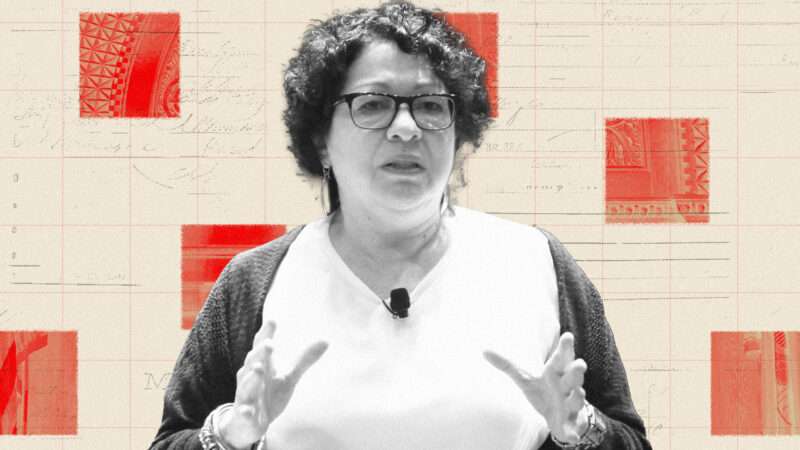
Consider the following hypothetical: You are jailed for two years as you await trial for murder. You are facing the death penalty. You have cancer, which relapsed during your incarceration without access to adequate treatment. And it turns out you were charged based on a false witness confession, which the local prosecutor allegedly destroyed evidence to obscure.
Now imagine suing that prosecutor and being told you have no recourse, because such government employees are entitled to absolute immunity.
This is the backdrop for Justice Sonia Sotomayor's opinion Tuesday arguing that the Supreme Court may need to reevaluate the confines of that legal doctrine—absolute prosecutorial immunity—which prevents victims of alleged prosecutorial misconduct from getting recourse in the vast majority of circumstances.
The case at issue centers around Nickie Miller, a Kentucky man whom a woman named Natasha Martin implicated in a bizarre murder plot after the government offered her a deal to avoid prison time. The primary issue: She almost immediately sought to recant that confession. Law enforcement wouldn't accept that. So she testified before a grand jury, and then tried to recant again, writing in jailhouse letters to another man she implicated that her statement came in response to "coercive interrogation techniques, threats, and undisclosed promises of consideration."
When Miller's defense team heard about those letters, it tried to obtain them. Martin reportedly asked Assistant Commonwealth Attorney Keith Craycraft how she should comply with the order, to which he allegedly responded that she should destroy the correspondence. She obliged.
The state eventually dropped the charges against Miller. The two years in jail, however, took a toll, according to his criminal defense attorney, who said that his cancer was in remission but recurred after the state locked him up, as he could not access his medication.
After his release, he sued Craycraft; the district court concluded he was entitled to absolute immunity. The U.S. Court of Appeals for the 6th Circuit subsequently noted that Craycraft's alleged misconduct was "difficult to justify and seemingly unbecoming of an official entrusted with enforcing the criminal law." And then that court, too, confirmed the grant of absolute immunity, a testament to the sort of behavior the doctrine greenlights with its sweeping inoculation.
Miller has since died, and his estate is continuing the litigation on his behalf.
"Craycraft's alleged misconduct of advising a witness to destroy evidence to thwart a court order is stunning," writes Sotomayor. "If this is what absolute prosecutorial immunity protects, the Court may need to step in to ensure that the doctrine does not exceed its 'quite sparing' bounds."
She also notes that "it is difficult to see how the conduct alleged here, including destruction of evidence to thwart a court order…is 'intimately associated with the judicial phase of the criminal process.'"
That latter quote comes from Imbler v. Pachtman (1976), the precedent in which the Supreme Court announced the doctrine of absolute prosecutorial immunity. A man who had spent years in prison, the Court ruled, could not sue a prosecutor who allegedly withheld evidence that eventually exonerated him.
Plaintiffs may find a rare exception to absolute immunity if they can show a prosecutor committed malfeasance outside the scope of his or her prosecutorial duties. It's a difficult task. Louisiana woman Priscilla Lefebure sued local prosecutor Samuel C. D'Aquilla after he sabotaged her rape case against his colleague in the justice system, Barrett Boeker, then an assistant warden at the Louisiana State Penitentiary in Angola.
D'Aquilla, as I wrote in the January 2023 issue of Reason, "declined to present the results of a medical exam that found bruises, redness, and irritation on Lefebure's legs, arms, and cervix. Instead, he offered a police report with his own handwritten notes, which aimed to highlight discrepancies in her story." He also "opted not to call as witnesses the two investigators on the case, the nurse who took Lefebure's rape kit, or the coroner who stored it. And he refused to meet or speak with Lefebure at all, telling local news outlets he was 'uncomfortable' doing so."
Upon evaluating Lefebure's suit, Judge Shelly D. Dick of the U.S. District Court for the Middle District of Louisiana concluded that some of D'Aquilla's actions fell under prosecutorial functions. But his "alleged conduct in failing to request, obtain, and examine the rape kit; making notes on the police report; and failing to interview the Plaintiff prior to the grand jury hearing," she wrote, "were investigative functions for which absolute immunity does not apply." The U.S. Court of Appeals for the 5th Circuit later overturned that, ruling that Lefebure didn't have standing.
There are other ways to punish prosecutors for corruption, as they "may still face criminal liability or 'professional discipline,'" Sotomayor notes today. "Yet, these safeguards are effective only if employed."
It's an important caveat. A core part of the Court's justification for absolute immunity is the notion that prosecutors face professional consequences for going rogue. But just as it is rare that a plaintiff can clear the former hurdle, so too is the latter option rarely exercised.
The post Sotomayor Is Right: The Supreme Court Should Reevaluate Absolute Immunity for Prosecutors appeared first on Reason.com.







